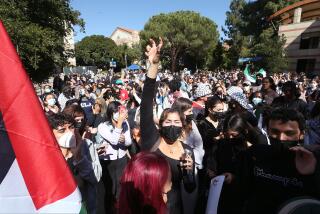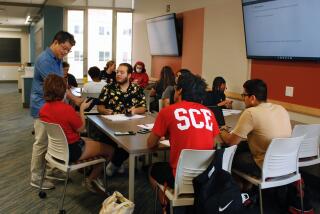Spirituality finds a home at college
- Share via
Sandwiched between a time of squirming under parental control and the tethers of a career, college often means freedom for young people to begin a search for who they are and what they believe.
For some, that may be just a quest for the nearest party. Yet for many students, college is a time to develop spiritually in ways that can endure after they’ve finished school, a new long-term study has found.
“It kind of opens the student’s mind,” Alexander Astin, one of the study’s authors and a professor emeritus of higher education at UCLA, said of the college experience. He called it a period “stimulated by exposure to new people and new ideas.”
Astin said young people often enter college knowing only what they were brought up to believe. They may never have been faced with opposing views. College is a safe haven in which they can explore their spirituality and challenge it.
The spirituality study, launched in 2003, was based on an initial survey of 112,000 American college freshmen, then a follow-up survey of more than 14,000 of the students after they completed their junior year at scores of colleges and universities nationwide. The researchers published their findings in a book released last month, “Cultivating the Spirit: How College Can Enhance Students’ Inner Lives.” Astin’s co-authors were his wife, Helen S. Astin, who is also a professor of higher education at UCLA, and Jennifer A. Lindholm, director of the university’s Spirituality in Higher Education project.
The study found that many students struggled with their religious beliefs and became less certain of them during their college years.
It also found that many young people eschewed the rituals of organized religion but embraced what the researchers defined as the cornerstones of spirituality: asking the big, existential questions; working to improve one’s community; and showing empathy toward other people.
“These spiritual qualities are critical and vital to many things a student does in college and after,” Astin said.
The researchers also found that students who were more spiritual typically performed better academically, had stronger leadership skills, were more amiable and were generally more satisfied with college.
Students engaged with the liberal arts were more likely to become spiritual; those in math and science fields were less likely. Partying and overexposure to television and video games tended to inhibit spiritual growth. Community service and taking time to reflect — as well as class assignments that encouraged those endeavors — encouraged spirituality.
The Rev. Jim Burklo, associate dean of the Office of Religious Life at USC, said that his 30 years of working with students through faith ministries reflects the researchers’ findings. “The job of higher education is to activate the imagination,” he said. “The moral imagination is a part of that.”
College courses on religious subjects help teach students how to read sacred texts with an intellectually curious eye.
But Burklo said that experience can be a “shattering blow to the doctrine under which they grew up and becomes a spiritual crisis. It’s very awkward for them, confusing and frightening. They’re questioning their own faith and salvation.”
Katelyn Endow, a senior at USC, said she has seen herself transform into a more spiritual and more religiously devout person in the time she’s been in college.
“I grew up in a Christian family, but I didn’t take my faith too seriously,” said Endow, 21, of Redwood City, near San Francisco. She joined a Christian student group at USC, where she made friends who pushed her to attend Bible studies and to examine her beliefs more deeply.
She lets the discussions in her Bible study sessions marinate. “It takes a while to process it,” Endow said. “I think about it while I’m walking home, doing chores, going about life, [and] I talk to friends who will challenge me.”
Sylvia Charles, a medical student at USC, said she had a spiritual awakening through yoga. That came when she was a Duke University junior and studying in Spain. Studying abroad is another opportunity for spirituality to blossom, researchers found.
Yoga, Charles said, led her to a greater spiritual awareness, despite the hectic pace of college life. It’s often a flurry of technology and text books and the melding of personal history with future goals, yet Charles managed to find a measure of calm.
“I think the really important message is the idea of being in the present moment,” said Charles, 24, of Melbourne, Fla. “As students, we lose so much energy dwelling on the past or looking to the future…. It’s a stressful time, trying to manage a busy and ambitious life.”
More to Read
Sign up for Essential California
The most important California stories and recommendations in your inbox every morning.
You may occasionally receive promotional content from the Los Angeles Times.













